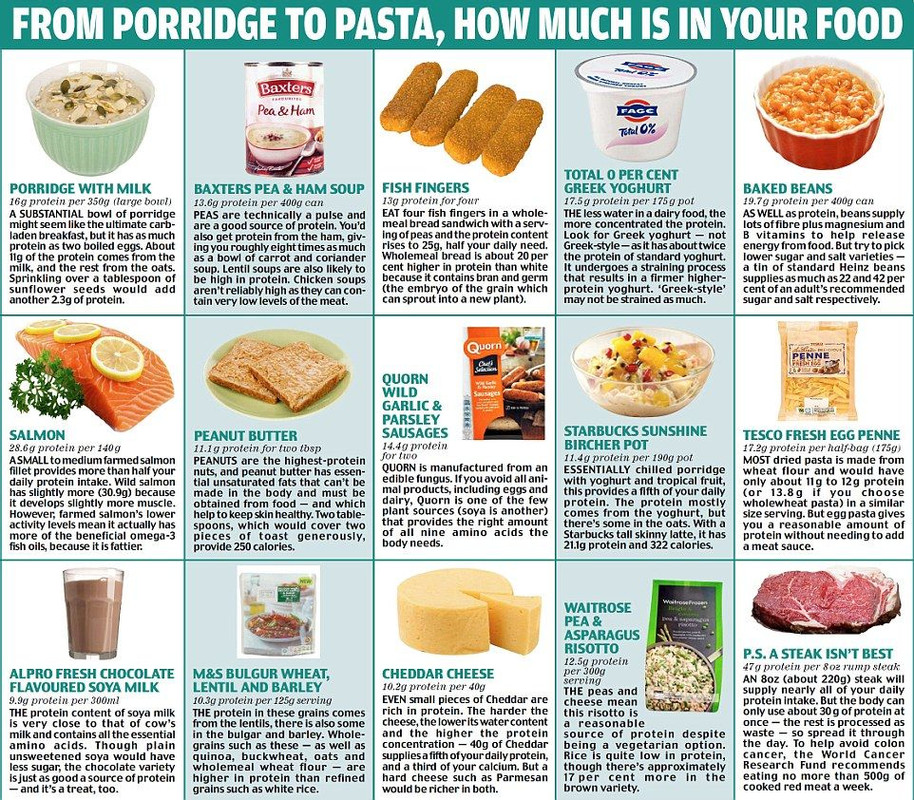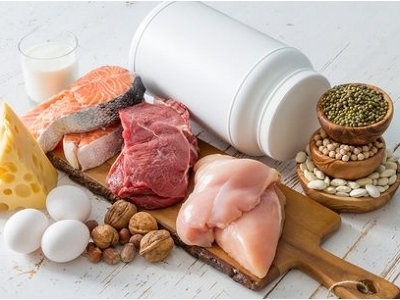High Protein, Too Much Protein, I'm so Confused!!
Listed Under: Blog
Protein forms one of our 4 major food groups, essential for optimal health, but recent media hype around the merits of low carb/high protein or high protein-high fat diets has confused many of us into skewing our balanced diets and ending up with side effects and symptoms we weren't ever told to expect!
So, what is protein?
Why do I need it?
Where do I get it from?
and
How much do I actually need?
So Proteins, what are they all about then?
Proteins form the primary building blocks of life itself. After water, protein is the most abundant substance in the human body. We need it for growth, repair, development, maintenance, it is crucial for a whole barrage of hormones that keep our body ticking over and is a major component of our immune systems.
Why do I need protein?
In our bodies proteins are broken down from their complex 3-dimensional forms into long chains of polypeptide molecules and further broken down into individual amino acid units (of which there are 22). Inside the cells, these amino acids building blocks are then used to synthesise new proteins, enzymes and hormones or will be stored in the body as fats. Of the 22 amino acids, our body can make 12 of them, but the remaining 10 are known as Essential Amino Acids - me must take them in form external sources - ie. in our foods. For effective protein synthesis, we need to be presented with all these amino acids, in the correct proportions. If one essential amino acid is missing, or in short supply, protein synthesis is negatively effected. This can often be a problem for Vegetarians and Vegans because some vegetable sources of protein lack the full essential amino acid spectrum.
.jpg)
Where do I find protein?
Generally speaking, animal proteins, such as meat, fish, poultry, eggs, dairy products, are termed 'complete proteins'; with a full complement of all essential amino acids and are also a major source of vitamin B12. However, they have little or no fibre, and can have higher amounts of cholesterol and saturated fats. An excess of animal proteins in the diet causes an increase in systemic acidity and a build up of urea.
Vegetables, fruits and plant sources of protein are generally regarded as 'incomplete proteins'; lacking or low in 1 or more essential amino acids. Nuts and legumes (beans) are more protein rich than seeds and some grains, but it is likely you would need to consume large quantities to meet your essential amino acid and B12 needs. A more helpful suggestion is to make sure that meals combine different plant-based protein sources in an attempt to maximise the essential amino acid delivery.
Eggs are a fascinating source of protein! Many people are concerned that eggs are high in cholesterol, but they also contain lecithin - a brilliant biological detergent, which emulsifies fats and allows the egg to deal with its; own high fat content. Interestingly, when we soft boil or poach an egg, so that the yolk still runs, the lecithin is in an active form that can bind the cholesterol. Hard boiled or solid yolked eggs renders the lecithin incapable of fat binding so the cholesterol content is higher. Therefore, it is advisable that we eat eggs maybe 1 or 2 times a week (or up to 5 x a week for vegetarians) bearing these cooking methods in mind. Interesting stuff eh?!
For all of us who are not Vegan or Vegetarian, an ideal to aspire to is to have a small amount of high quality, animal protein and eat more plant-sourced proteins where we can, as they are lower in fat and can be higher in quality.
How do I know if I'm low in protein? How much do I need then?
If our diet is low in protein we can end up feeling lethargic, lacking energy, weak, depressed even, and show signs of slow wound healing, low recovery rates (long recovery times) from illness and generally find ourselves more susceptible to infections. If we are putting ourselves under greater physical and/or mental stress, through training hard, over exercising, work stress, emotional turmoil, our requirement for protein increases as a natural part of our body's repair and protection mechanisms.
However, taking in excess protein is really not good! It creates a very acidic environment within the body, linked by some to increased risks of inflammatory diseases and cancers, and promotes the build up of urea and uric acid. If this accumulates in the joints, inflammatory conditions such as chronic headaches, arthritis and gout prevail. If the excess protein is converted to ammonia, we just wee it out! What a waste!
But how much is enough and how much is too much?
This is where the fitness sector and medical and nutrition sectors do not always agree. If you are aiming to build lean muscle and are working with a sports nutritionist, then their advice may differ from this, written very much with the 'average' person in mind.
In general, the 'old thinking' was that we require 1g of protein for every kg of body weight, so a 75kg person would require 75g of protein per day. However, the 'new thinking' is that we don't require anything like that much, and between 20 and 30g of protein per day is adequate, as long as that is from a mixture of animal and plant based sources. Other sources suggest calories from our protein intake should amount to 10-15% of our daily intake.
If you are training for long periods of time, then it might be advisable to increase your protein intake, but not crazily so.
If you train for over 2 hours in a day, your daily protein intake that day should represent about 1.2g per kg of your body weight.
If you are training for 2-4 hours, then go for 1.4g per kg of your body weight. It is only if you are training for over 5 hours or more a day you need to ramp up your daily intake that day to 1.5g per kg body weight.
You can find that protein in a wide array of every day foods too, if you know where to look!

To finish though, an important factor always to acknowledge is that, when we talk about any food, the quality of that food is key. Buy the best you can, locally produced is great and if you can afford it and believe it from an ethical point of view, go for Organic.
Despite the phrase being banded around all the time, there is no such thing as an average person and this can make recommending food and building plans a tricky area of expertise. No one size fits all. No one plan is perfect for everyone. We each have our own genetics and biochemistry, intrinsically linked to create the expression of a set of genes that determine our overall health, wellbeing and ultimately our future. Our body types are unique, our energy outputs are different, our likes and dislikes and our past history...everything is different. We are unique individuals with out own bespoke nutritional requirements. However, the basic principles of a balanced diet, outlined in another of my blogs (https://www.tipthebalance.life/what-do-we-even-mean-by-a-balanced-diet) should form the basis of our daily intake.
Ultimately, stop comparing yourself to others.
Find out what works for you and your body and go with it.
And if you're still confused...ask for some help :-)


 loading...
loading...